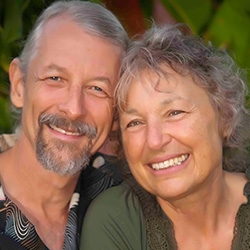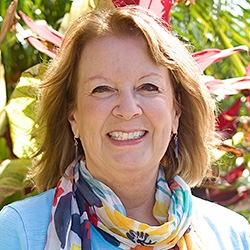

Search Results: connection
-
Listen to Jim and Jori Manske share their understanding of discernment to gain clarity, insight, and wisdom for making life-serving distinctions and choices.
-
What's really going on underneath the surface when we bring or encounter blame, judgements, pain -- and thereby the inability to empathize, be present, attuned, or responsive? Why does this happen even if one or more people in a relationship dynamic is working hard at bringing in an NVC response? This article addresses these and more questions from the perspective of how our brains are affected in our relationships.
-
Open your heart across differences with humility and courage as you explore new perspectives.
-
Ask the Trainer: Understanding your needs behind using protective force with children.
-
Learn the Zero Step to focus on connection and affirm living in the present.
-
According to this article, what we do before we move into the NVC dance profoundly influences the outcome and everyone involved. This "before" step increases the likelihood of living compassionately, and our support openness to outcome. It can also make our NVC practice less connecting, and more evaluative. The article addresses these points and talks about ways to move beyond the dead past, and the imagined future, to step into the the only “time and place” that both NVC operates and that the connection we so fervently want actually exists (ie. the present moment).
-
The impulse to say "I love you" is an opportunity to check-in both with our level of presence (eg. are we saying it by rote?) and also with what we really mean in that moment (eg. what are the needs and real purpose deep beneath the word "love"?). This can invite us to explore a deeper, more heartfelt way of communicating and being...
-
Trainer tip: When you tell yourself that you have to do something, you're more likely to disconnect yourself from the needs you’re trying to meet, and also diminish the joy in your life. Instead, experiment with translating your “shoulds” and “have tos” into the need you are trying to meet.
-
Ask the Trainer: Dealing with judgments about you when the speaker's true unmet need is hidden.
-
Ask the Trainer: Get ideas to help your girlfriend accept you aren't responsible for her feelings.
-
What exactly IS empathy? Empathy is the connection that happens between you and another when you experience your differences while holding on to underlying threads of commonality. In this recording, John will be sharing in-depth practices designed to give you the ability to speak and listen from a place of empathic presence, as well as a Self-Connection Practice specially formulated to help you come back to that empathy connection when you’ve gotten triggered into “fight-flight-freeze.”
-
Live in alignment with the core values of nonviolence through 17 guiding commitments.
-
Learn tools to reconnect and heal your relationship with adult children.
-
- Celebrate and nurture your relationship to the Earth — and each other!
- Explore your connections to family, partner, work, nature, self and more
- Discover new ways to grow in community and work together to make this world a better place
- Engage and immerse yourself in NVC while making new friends!
-
CNVC trainer Yoram Mosenzon shares how expressing specific and authentic appreciation can deepen connection in intimate relationships. He emphasizes the importance of making clear observations without judgment and connecting with the feelings and needs that arise from meaningful gestures.
-
Jim Manske demonstrates using NVC and self-connection to create sincere, healing apologies.
-
Trainer Tip: Taking time to mourn our regrets and unmet needs can lead to a deeper self-connection and feelings of peace.
-
Ask the Trainer: Get guidance on working with enemy images and exercises that bring relief.
-
Miki Kashtan helps a mother restore connection with her daughter after a painful conflict.
-
Live from the beauty of needs through deep self-compassion and spacious inner transformation.
Quick Links

Stay in Touch!
We value your privacy, won't share your email address and you can easily unsubscribe any time.




















